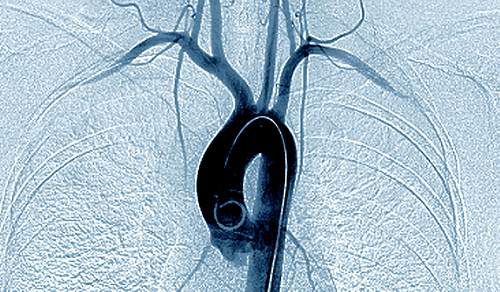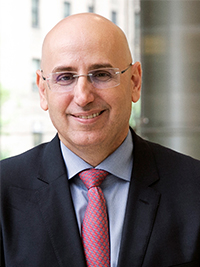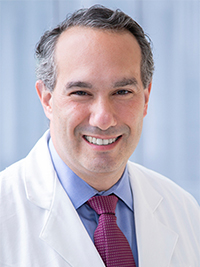Wave of the Future: Remote Cardiac Monitoring for Heart Failure
NewYork-Presbyterian’s Centralized Heart Failure Management Program in partnership with Columbia and Weill Cornell Medicine is applying the latest evidence-based technology in remote cardiac monitoring to manage patients with symptomatic heart failure from their home. This approach is part of Dr. Nir Uriel's and Dr. Gabriel Sayer’s five-phased vision of using patient specific data and artificial intelligence to identify and monitor patients with heart failure, and in the future prevent the condition from developing.
With six million adults in the United States with heart failure and half a million with advanced heart failure, the burden on society is immense. “An increasing number of patients are suffering from heart failure, and not every patient is able to access the level of care they need,” says Nir Uriel, MD, MSc, Director of Heart Failure, Heart Transplantation and Mechanical Circulatory Support Programs at NewYork-Presbyterian. “There are options today that can help improve quality of life and increase longevity. Our goal is to reach as many of these patients as possible, regardless of where they live or their means.”
This goal took on a new meaning when COVID-19 essentially closed down the country and patient care took a sharp turn toward telehealth. Dr. Uriel and his colleagues across cardiac specialties at Columbia and Weill Cornell Medicine knew that their heart failure patients – many whose disease course involves numerous hospitalizations and frequent outpatient visits – would be especially vulnerable. These concerns propelled NewYork-Presbyterian’s heart failure team to launch phase one, the Centralized Heart Failure Management Program, early to allow their teams to remotely monitor patients safely from home.
Dr. Nir Uriel
Dr. Gabriel Sayer
Dr. Kelly Axsom
The Centralized Heart Failure Management Program is a unique program at NewYork-Presbyterian that was launched during the COVID pandemic in April 2020 with an enrollment of 95 patients. By 2022, this number had soared to an overall enrollment of 620 patients, with over 270 actively on remote cardiac monitoring.
The dedicated heart failure team is led by Kelly Axsom, MD, Medical Director of the Centralized Heart Failure Management Program. The team partners with local doctors and monitors patients using remote monitoring technology to measure pulmonary pressure, blood pressure, weight, and other physiologic changes that are used to adjust a patient’s medical regimen. “Patient-initiated sensor readings are taken daily from the patient’s home and wirelessly transmitted to a secure website for clinicians to access and review,” says Dr. Axsom. “The heart failure team can then determine if the patient’s heart failure is worsening, often prior to a patient experiencing symptoms, and if intervention, medication adjustment, or other treatment changes are required.”
“Using the latest physiologic-based monitoring systems, our heart failure team has developed a custom algorithm and dashboard to identify patients with worsening heart failure so that we can intervene prior to an overt decompensation or readmission to the hospital,” adds Dr. Sayer.
The promising approach of remote cardiac monitoring has led to the emergence of a number of devices incorporating either invasive or noninvasive technologies. To examine these technologies – their advantages and limitations – Columbia and Weill Cornell Medicine faculty undertook a comprehensive review published in the December 29, 2021 issue of JAMA Cardiology in which they detail the current advances and challenges, as well as the major clinical trials that are underway evaluating these technologies.
As a fledgling field that is undergoing rapid development, remote cardiac monitoring has begun to reveal certain challenges that need to be overcome. These include data safety and security, reliability and durability of the systems, applicability across heart failure phenotypes, and accessibility by patients who are not proficient in technology or have limited internet access. Dr. Uriel and his colleagues note that machine learning techniques may address some of these issues by facilitating the establishment of noninvasive indicators that are pertinent to heart failure decompensation.
The authors conclude, “The implementation of these technologies marks a transition in the heart failure field…to better treat patients with advanced heart failure without the necessity of frequent in-person visits and with the expectation that remote cardiac monitoring will lead to better outcomes for the heart failure patient population as a whole.”
Read More
Remote Cardiac Monitoring in Patients With Heart Failure: A Review. Kennel PJ, Rosenblum H, Axsom KM, Alishetti S, Brener M, Horn E, Kirtane AJ, Lin E, Griffin JM, Maurer MS, Burkhoff D, Sayer G, Uriel N. JAMA Cardiology. 2021 Dec 29. [online ahead of print].
Related Publications










